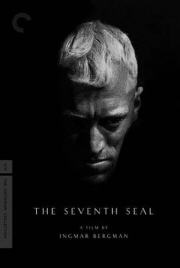- Rated NR
- Drama
- 1957
- Buy the DVD
Reviewed by Bob Westal
()
ngmar Bergman’s 1957 landmark is in many respects the ultimate “arty foreign flick.” Credited with launching the mid-century foreign film craze on college campuses and boho communities around the U.S., Sweden’s “The Seventh Seal” is frequently listed alongside “Citizen Kane,” “The Seven Samurai” and “The Rules of the Game” as one of the top four or five greatest works of film art. It’s also a serious contender for the most parodied film of all time, having been sent up in innumerable places and contexts including Woody Allen’s “Love & Death,” “Bill & Ted’s Bogus Journey,” and the “Cheating Death” segment of “The Colbert Report.” The downside of its huge artistic rep is that probably no other single film has had to deal with as much of an “eat your vegetables” reputation, so that even some cinephiles approach watching it more as a duty than a pleasure – even though many other art house faves are actually far more unapproachable. It’s gotten to the point where even many serious film fanatics downplay it, avoid it completely, or achieve a kind of super film snob nirvana by looking down their noses at it.
They get away with that last part because of something you’ll never know about “The Seventh Seal” until you actually see it: as death-obsessed, arty foreign flicks go, it’s actually kind of fun. There’s no getting around the portentous stylistic flourishes or the deep dish subject matter – nothing less than the meaning of life and death – but Bergman’s signature film also has its share of risqué knockabout humor, as well as a bit of horror, violence, more than a little melodrama, and some of the most stark black and white imagery ever committed to film. It’s important to realize, though, that this might not actually be Bergman’s best film. Heck, as with any movie, it’s possible you’ll hate it. You have my permission.
The setting is medieval Europe at the time of the devastating Black Plague. Knight Antonius Block (Max von Sydow), who has recently returned from the pointlessly bloody crusades, is confronted by the hooded figure of Death (Bengt Ekerot). It should be curtains, but the warrior insists that, while his body might be afraid, he himself is not. He nevertheless challenges the specter to the most famous board game in movie history -- a single game of chess, which he has correctly surmised is Mr. Personified Death’s weakness. The delaying tactic works for the length of the film, as the knight and his cynical squire (Gunnar Björnstrand) have a series of encounters, all variously dealing with the subject of life and its inevitable end, as plague-borne hysteria sweeps the land and threatens Jof, a likable actor (Nils Poppe), Mia, his loving wife (Bibi Andersson), and their infant son.
It would be fair to call “The Seventh Seal” episodic, as it has no obvious storytelling through-line. At the same time there is a general narrative thrust that moves the tale onward. A heartbroken blacksmith (Åke Fridell) mistakes Jof, the affable performer, for his ex-business partner, who has run off for a fling with the smith’s wife. An encounter with the smith in a tavern starts in a friendly fashion, but the medieval suspicion of anything as fun and potentially enlightening as theater, means that an actor can be beloved one second and hounded practically to his death the next. Later, an alleged witch (Maud Hansson) seems convinced she’s in league with Satan, but has probably simply been driven insane by torture. In both cases, the figure of Gunnar Björnstrand’s cynical squire enters as a reluctant possible rescuer – a droll Scandinavian hard case who, with an ethnic adjustment, could have easily fit into the cast of “The Seven Samurai.”
Meanwhile, von Sydow’s knight is busy ruminating on his inability to either fully believe, or fully disbelieve, in God and life after death. Considering that he’s spending a good chunk of the movie discussing the matter with a supernatural being, albeit a symbolic one, you’d think he’d have a more positive outlook. In any case, Bergman supports his doubt. The conclusion of the tale is both humane and uncompromising. The ending is neither happy nor, really, unhappy.
Bergman was a great screenwriter, but his famed visual brilliance was equally important. The stunning, dark vistas portrayed by Bergman and cinematographer Gunnar Fischer are among the most striking and memorable in film history. They also underline Bergman’s debt to John Ford, the ultimate American classical filmmaker with whom he shared far more in common than with the cinema hipsters of the French and Italian New Wave.
Like Ford, Bergman enjoyed working with the same actors from film to film, and most of the outstanding cast would be return in high style in future Bergman prospects. Max von Sydow, of course, would become an international star/super-character actor of a rather transcendent sort. Currently set to appear in Martin Scorsese’s upcoming “Shutter Island” just a few months after his 80th birthday, what other actor can say he’s played any number of ordinary men, assorted assassins, Jesus, Ernst Stavro Blofeld, and Ming, the Merciless?
Despite its importance and my admiration, you might have noted some restraint in this review – and also the fact that I’m giving a film of this stature a mere four stars out of five. Why? For starters, there are other Bergman films for which I may have had more of a personal affection. In particular the Dickensian comedy, pathos, and magic realism of “Fanny and Alexander” gave me one of the most pleasurable evenings at the movies I’ve ever enjoyed. The metaphysical hi-jinks of “The Magician” turned one dreary day in film school into something really special. Still, I don’t think that’s really the issue.
The real reason for my muted response is that even we critics can be overwhelmed by a film’s reputation, and also our past experiences of it. I think I was hoping a bit too hard to be as enthralled this time as I was in years past. After decades of watching “The Seventh Seal” in beat-up archival prints with grating sound problems, seeing it presented flawlessly somehow seems to demand a near religious experience and, feeling that way, means that any such experience is impossibility.
Still, transcendent times could be ahead. Great films – and I do think “The Seventh Seal” is a great film – have a way of revealing themselves to you over time. I’ll be playing chess with this movie specter again before too long.
Criterion Collection DVD Review:
Considering this is a Criterion DVD of Ingmar freakin’ Bergman’s most famed film, nothing less than a truly exquisite package would be expected and that’s pretty exactly what the company has delivered. “The Seventh Seal” has never looked and sounded even close to this good in all its black and white, 1:33 aspect ratio, majesty in all the decades I’ve been watching the film in various formats. That alone makes this package a great addition to any film geek’s library. As for extras, Disc One has a scholarly commentary with Bergman historian Peter Cowie, who might be a little worshipful and high-minded for my taste, but who nevertheless delivers a valuable explanation of Bergman’s goals in making the film and its huge worldwide impact. An English-language audio interview with Max von Sydow is also included and very much of interest to anyone fascinated by Sweden’s most world-famous actor.
Disc Two features “Bergman Island.” It might sound like a symbolism-laden reality show, but it’s actually an 83-minute encounter from 2006 with the elderly director, living a borderline hermetic existence on a remote island. Since Bergman was very near the end of his life and apparently just as philosophical and downbeat as many of his films, it’s necessarily a bit dour but certainly worth watching. Also included is “Bergman 101.” Narrated by Peter Cowie, it’s a 30-minute jaunt through Bergman’s lengthy filmography. Also included is a booklet with an interesting essay by Gary Giddins, in which he observes that Bengt Ekerot as Death bears a striking resemblance to Dwight Eisenhower.
You can follow us on Twitter and Facebook for content updates. Also, sign up for our email list for weekly updates and check us out on Google+ as well.












